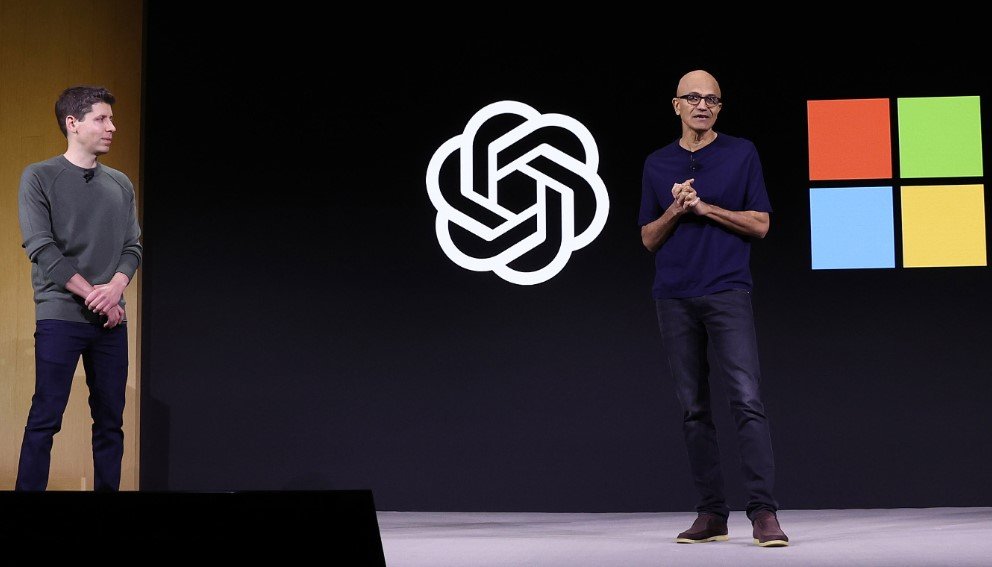Microsoft shares climbed more than 4 percent on Wall Street after the company sealed a major deal with OpenAI, valuing the AI firm at 500 billion dollars. This agreement, announced on October 28, 2025, lets OpenAI shift from a nonprofit structure to a public benefit corporation, opening doors for easier fundraising and growth.
Details of the Microsoft OpenAI Partnership
The deal marks a big step in the ongoing relationship between Microsoft and OpenAI. It removes old limits on how OpenAI can raise money, which started back in 2019 when the company began as a nonprofit focused on AI safety.
Under the new setup, OpenAI will become a for-profit entity called OpenAI Group PBC. This change aims to support big plans like building data centers and advanced tech. Microsoft, a key investor since 2019, now holds a 27 percent stake in this new structure.
OpenAI’s nonprofit side will turn into the OpenAI Foundation. It will keep a large stake worth about 130 billion dollars in the for-profit arm. Leaders say this keeps the company’s mission alive while allowing more business freedom.
Sam Altman, OpenAI’s CEO, will not get any equity in the new entity. The focus stays on growth without plans for a quick public stock offering.

How the Deal Boosted Microsoft Stock
Microsoft stock reacted strongly to the news. Shares jumped to an intraday high of 553.72 dollars during trading on October 28, 2025.
By midday, the price settled at 543.23 dollars, up 2.18 percent from the previous close. This surge added to Microsoft’s strong year, with shares up 29.65 percent so far in 2025.
Over the past five years, Microsoft has delivered over 168 percent returns to investors. In the last year alone, gains reached 27 percent. The stock hit a 52-week high of 555.45 dollars earlier, showing steady upward momentum.
The company’s market value now stands at 3.95 trillion dollars, making it one of the world’s top firms. This deal highlights how AI investments drive stock performance in tech.
Background on OpenAI’s Growth and Challenges
OpenAI started as a nonprofit in 2015, aiming to build safe AI. It gained fame with tools like ChatGPT, which changed how people use AI daily.
Microsoft poured in 13.8 billion dollars since 2019. This investment has grown nearly ten times, thanks to OpenAI’s quick rise.
The shift to a for-profit model addresses funding needs for huge projects. Leaders like Altman plan to create platforms where others can build on OpenAI tech.
Yet, challenges remain. OpenAI faces competition from firms like Google and Meta. Regulatory scrutiny on AI ethics and safety adds pressure.
Recent events, such as global AI summits in 2025, stress the need for balanced growth. This deal could help OpenAI stay ahead in the fast-paced AI race.
Here are key milestones in OpenAI’s journey:
- 2015: Founded as a nonprofit AI research lab.
- 2019: Microsoft invests first billion dollars.
- 2022: ChatGPT launch sparks worldwide AI boom.
- 2025: Restructures to public benefit corporation.
Impact on the AI Industry and Investors
This agreement shakes up the AI world. It values OpenAI at 500 billion dollars, topping even SpaceX as the most valuable private company.
For investors, it signals strong faith in AI’s future. Microsoft’s stock surge shows how partnerships can boost market confidence.
Broader effects include more AI innovation. OpenAI plans to let developers build tools on its platform, sparking new businesses.
However, some worry about losing nonprofit roots. Critics say profit focus might shift away from safety goals.
Looking ahead, this could lead to more deals in tech. Similar moves happened in past booms, like the internet era of the 1990s.
| Aspect | Details |
|---|---|
| OpenAI Valuation | 500 billion dollars |
| Microsoft Stake | 27 percent |
| Investment Return | Nearly 10 times original 13.8 billion dollars |
| Stock Surge | Over 4 percent on October 28, 2025 |
| Market Cap | 3.95 trillion dollars |
What This Means for the Future
Experts see this as a win for both companies. It frees OpenAI to chase ambitious goals, like advanced AI models.
For Microsoft, it strengthens its AI edge in products like Azure cloud services. This builds on past successes, such as integrating AI into Office tools.
The deal ties into 2025 trends, including rising AI adoption in business. Global AI spending is projected to hit 200 billion dollars this year, up from 150 billion in 2024.
Investors should watch for similar partnerships. Tech giants are racing to lead in AI, which could drive more stock gains.
As AI evolves, this partnership might shape how the industry grows. It balances profit with public good, setting a model for others.
Share your thoughts on this deal in the comments below. Did it change your view on investing in AI stocks? Spread the word by sharing this article with friends interested in tech news.
